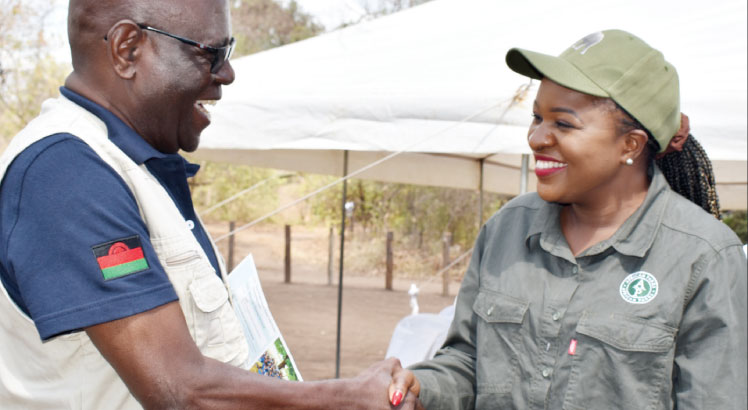Man who saved Majete
A wildlife reserve where nearly all animals had been hunted out has become Malawi’s sole home of the Big Five— lions, leopards, rhinos, elephants and buffaloes.
This is the story of Majete Wildlife Reserve in Chikwawa District, about 75 kilometres southwest of Blantyre City
The reserve was “under siege” 20 years ago when the government partnered with African Parks to conserve it.
“I saw Majete spiralling down and everything was falling apart,” says Leonard Sefu, then director of Parks and Wildlife. “Most animals had been poached. All the elephants were gone, logging of hardwood was rampant and bushfires and charcoal production were wiping out the trees.”
He retired in June 2013, 36 years after he joined the Department of National Parks and Wildlife as a ranger learning on the job.
Sefu’s civil service career came to a close a decade after signing the deal with African Parks to conserve and manage the ransacked wildlife reserve.

Rare public servant
Sefu had worked in all nine wildlife reserves and national parks nationwide when he rose to the helm of his department in 1999.
“It was around the same time Majete’s lost glory left me in awe. I was convinced that the government could not save the tourist attraction single-handedly,” he says.
Meanwhile, the departmental head was approached by the late Anthony Hall-Martin, the co-founder of African Parks, whose eyes were far from Majete and would ironically become his favourite wildlife reserve.
“When I met Dr Hall-Martin, he wanted African Parks to run Liwonde National Park, which had greater potential. They didn’t want Majete, but that is where we needed help most,” he recalls.
For three years, Sefu was at the centre of negotiations with his staff, gatekeepers, policymakers and African Parks to save the ransacked reserve.
“Transparency and accountability were crucial. I discussed the proposal at length with my officers in a boardroom and we settled for Majete as Liwonde National Park could take care of itself,” her recounts.
Sefu also met authorities in the Office of the President and Cabinet as well as the regulator of public-private partnerships.
He said: “With their blessings, I went back and implored Hall-Martin: ‘Why can’t you take Majete and prove yourself to manage even more national parks and wildlife reserves?’ Majete was getting out of hand, so he grudgingly accepted, but it has paid off.”
All eyes were on delighted Sefu last month during the 20th anniversary of the government’s collaboration with African Parks in Majete, now the country’s most endowed and visited wildlife reserve.
The barren woodlands where no elephant roamed in 2003 and no tourist went for three years has become a safe haven for more than
13 000 animals, African Parks reports.
They include lions, elephants, rhinos, leopards and buffaloes.
The charity has brought about 3 500 to Majete since rhinos arrived in 2003. Elephants followed in 2006, lions in 2012, cheetahs in 2019 and wild dogs in 2020.
In 2016, it contributed 200 elephants to the translocation of 500 elephants to Nkhotakota, where fewer than 100 survived decades of uncontrolled poaching.
The replenished Majete became not only the favourite destination for Hall-Martin, but more than 12 000 tourists who shelled about $617 000 (about K650 000) last year.
One of a kind
Minister of Tourism Vera Kamtukule hails Sefu for selflessly advising policymakers that the government could not manage Majete single-handedly.
“Without sound advice and candid decision-making, we wouldn’t be here celebrating 20 years of Majete’s restoration,” she says.
The minister likens Sefu to Rowland Samuel Ngosi, the unsung hero who survived the sinking of MV Viphya in Lake Malawi in 1946 and swam ashore with a wooden box containing civil servants’ salaries. He delivered the money in Rumphi, Karonga and Chitipa without pinching a coin.
“Sefu’s patriotism, transparency and accountability are rare in the country where many people think government officials don’t do their work properly. When one brings a proposal, we say they want to steal from us or ask what’s in it for us.
“But history will judge Sefu positively and I’m glad we are celebrating him while he is still alive.”
Some roads in the wildlife reserve have been named after the negotiator of the transformative partnership, but Kamtukule says he deserves a plaque for generations to learn from “this story of patriotism.”
African Parks country director Samuel Kamoto says the future of wildlife conservation in Africa is partnerships.
For him, the rehabilitation of Majete is “a testimony of how Mother Nature bounces back if given a chance to do so”
And African Parks keeps expanding its footprint in Malawi.
In 2016, it signed a concession to co-manage Nkhotakota Wildlife Reserve and Liwonde National Park with the Department of Parks and Wildlife. Two years later, the Liwonde deal was extended to include Mangochi Forest Reserve where elephants and other animals from the national park roamed amid massive poaching, logging and charcoal making.
“The country’s wildlife needs to be valued and jealously guarded for tourism and future generations to enjoy our natural heritage. Wildlife has no price,” says Kamoto.
Now farming in Lilongwe, Sefu says: “I am so excited that the park is rejuvenated and what we wanted more than 20 years ago has proved a success.
“The story of Majete has turned the most successful learning point beyond the region.”






One Comment